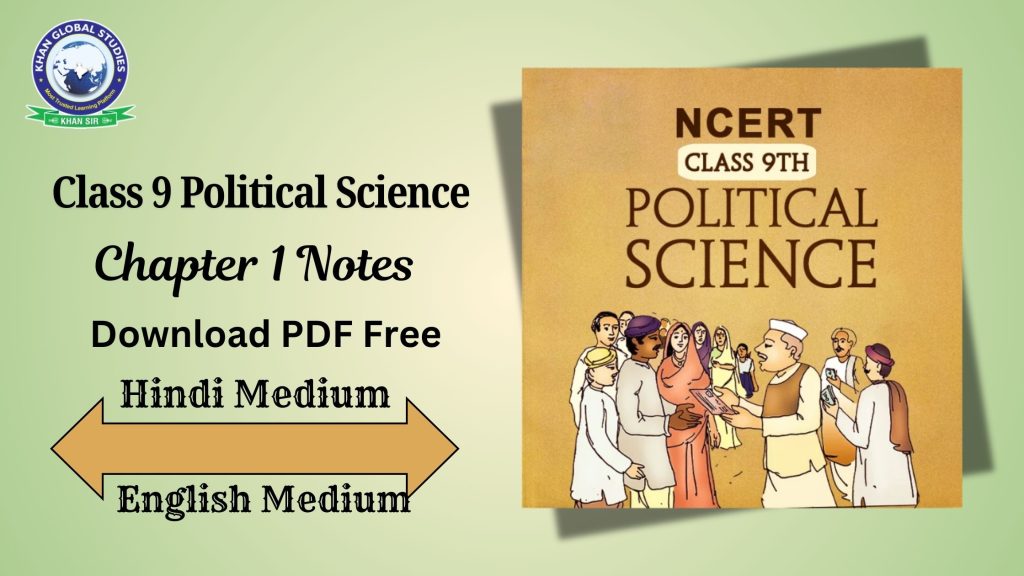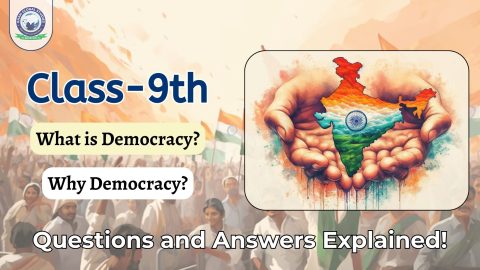In education, especially in the CBSE curriculum, Class 9 Political Science is a foundation course which introduces students to the basic concepts of governance and democracy. Chapter 1 “What is Democracy? Why Democracy?” explains the concept, features and importance of democracy and gives students an overall understanding of this political system.
What is Democracy
Democracy can be defined as a form of government in which leaders are chosen by the people through free and fair elections. In this system citizens have a direct say in how they are governed, whereas in non democratic regimes power is often seized or inherited rather than elected.
Features of democracy:
- Elected Representatives: In a democratic setup rulers are not self appointed; they are elected representatives of the people.
- Free and Fair Elections: A basic feature of democracy is the conduct of elections which are transparent, competitive and inclusive where every eligible citizen can participate without discrimination.
- Political Equality: The principle of one person, one vote ensures that every citizen’s vote has equal weightage, ensures fairness in political representation.
What are the features of Democracy
The chapter explains several basic features of a democratic government:
- Regular Elections: Democracies hold elections at regular intervals so that citizens can choose their leaders and influence governance.
- Rule of Law: In a democracy laws govern the land rather than individual whims. This ensures all citizens are treated equally under the law.
- Protection of Rights: Democracies give priority to protection of individual rights and freedoms so that citizens can express their opinion freely and participate actively in political processes.
Why Democracy?
The chapter not only explains what democracy is but also its advantages over other forms of governance. Here are some reasons why democracy is considered the best form of government:
- Accountability: Democratic governments are accountable to the citizens. For example during crises like famine or economic downturn, democratic countries respond more effectively because they are answerable to their voters.
- Conflict Resolution: In diverse societies, democracy provides a mechanism for peaceful conflict resolution through dialogue and negotiation rather than violence or repression.
- Citizen Dignity: By ensuring political equality and participation, democracies give dignity to all citizens regardless of their social or economic status.
- Self Correction Mechanism: Democracies provide public scrutiny and debate on governmental decisions. This openness allows societies to correct mistakes through electoral processes.
Demerits of Democracy
Though democracy has many advantages, it is not without flaws. The chapter explains:
- Instability: Frequent change of leadership can lead to political instability and hinders long term planning.
- Corruption: Competitive elections can lead to corruption as politicians will go to any extent to get power.
- Complex Decision Making: The need for broad consultation can slow down decision making especially during emergencies.
Democracy in a Broader Sense
It’s not just about governance; it’s about the principles that govern our social interactions. The chapter introduces you to:
- Direct vs. Representative Democracy: Direct democracy is where citizens vote on issues directly, while representative democracy is where elected officials make decisions on behalf of the people.
- Community Decision Making: In smaller communities, direct democracy can work, where all members can participate actively in decision making.
Conclusion
Class 9 Political Science Chapter 1 is the foundation to understand democracy and its role in modern governance. By learning about its definition, features, advantages and disadvantages, you will know why democracy is the preferred system for many countries.
This will help you in your exams and also make you think critically about civic issues and understand the value of your participation in democratic processes. As future leaders and citizens, you will be able to contribute to your community and society.





